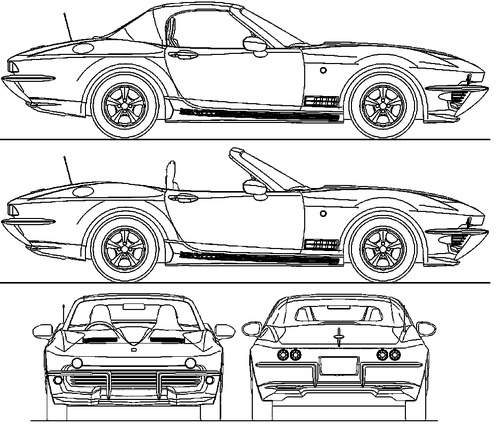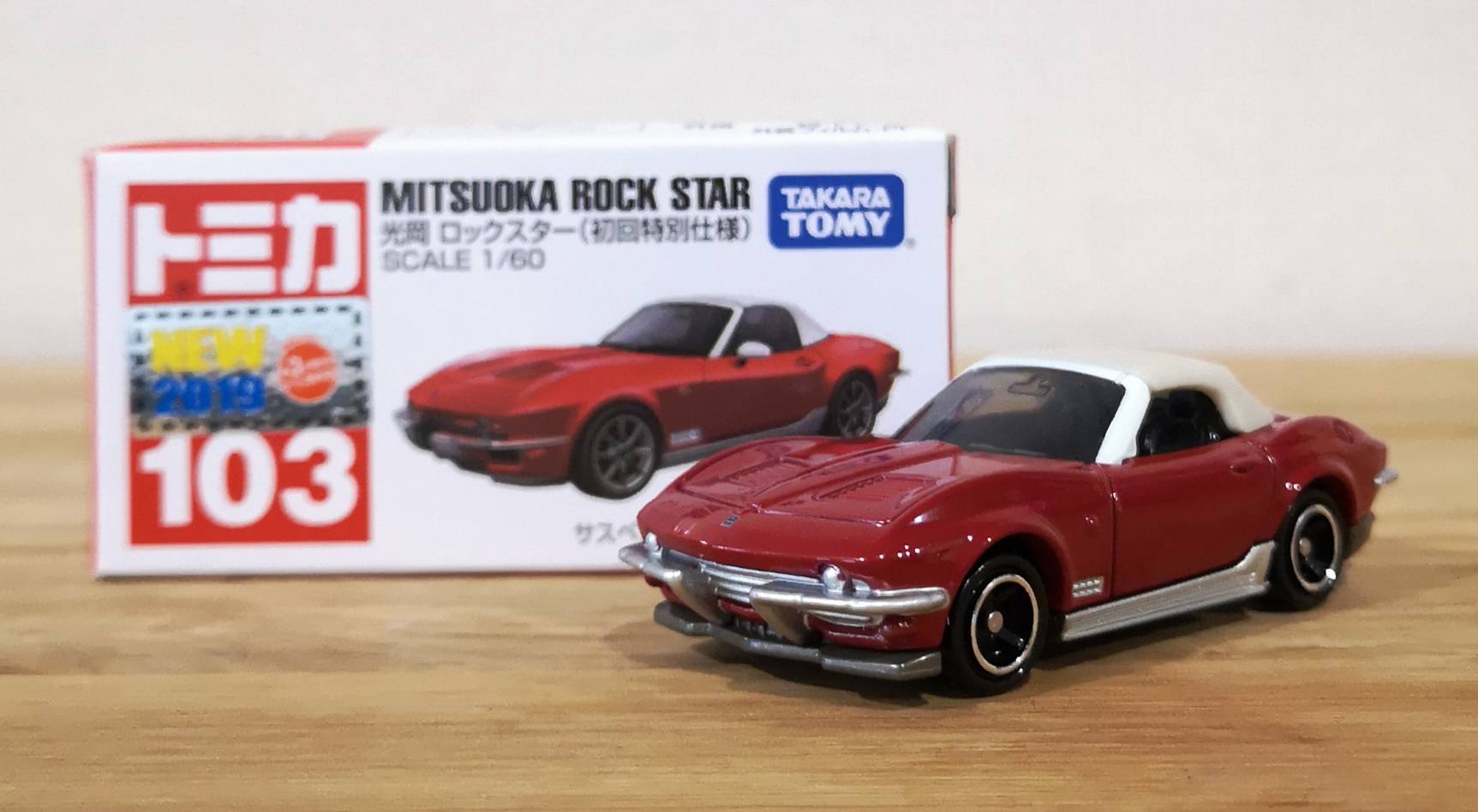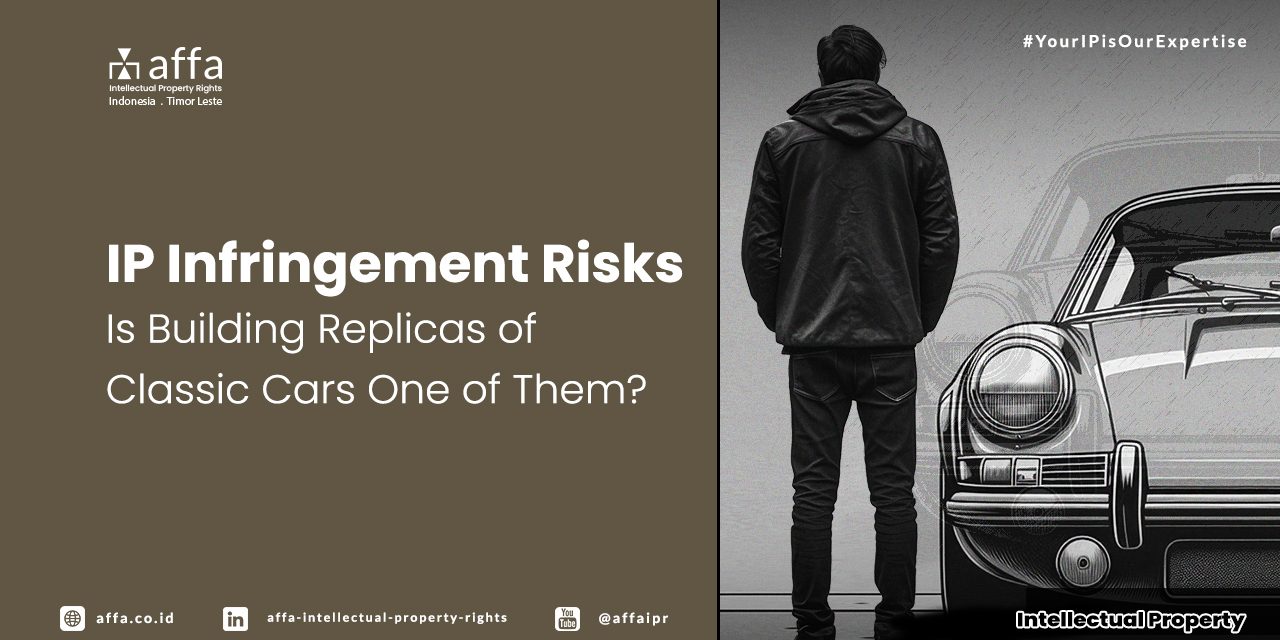Owning a rare classic car, even at a high price, can be a source of pride. What’s unique is that several classic cars, such as the Porsche 911, Shelby Cobra 427, and Ford Mustang GT500, which are widely used by Indonesian celebrities, are local manufacturers, aka custom or modified results from different cars. How is this practice viewed from an Intellectual Property law perspective?
In the production of vehicles, or in this case specifically four-wheeled cars, there are at least three categories of Intellectual Property (IP) related to it, namely Trademarks, Industrial Designs, and Patents. Let’s describe the details one by one.
Car Name & Logo are the Exclusive Rights of the Trademark Owner
According to the Trademark Law, a Trademark is a sign in the form of an image, name, word, letters, numbers, color arrangement, or a combination of these elements, which has distinguishing power and is used in trading activities for goods or services. The names and logos of well-known cars such as Porche, Shelby Cobra, and Ford Mustang are the property of Porche AG, Carroll Hall Shelby Trust, and Ford Motor Company, respectively. These Trademarks have been registered and recognized as well-known marks and are protected in many countries, including Indonesia.
The trademark’s ownership and protection are valid for ten years and can be extended. Therefore, there is very little chance for you to own or commercialize this Trademark in Indonesia without establishing official cooperation with the Trademark owner or its official distributor in Indonesia.
Regarding the use of Trademarks without permission, Article 100, paragraphs (1) and (2) of the Trademark Law clearly states, “Every person who without right uses a Trademark which is completely the same as a registered Trademark belonging to another party for similar goods and/or services which produced and/or traded, shall be punished with imprisonment for a maximum of 5 years and/or a fine of a maximum of IDR 2 billion.”
Industrial Design – Aesthetic External Appearance Protection
Another IP that is closely related to cars is Industrial Design. According to its definition, Industrial Design is the creation of a form of configuration, or composition of lines or colors, or lines and colors, or a combination thereof in a three-dimensional or two-dimensional form which gives an aesthetic impression and can be realized in three-dimensional or two-dimensional patterns and can be used to produce a product, industrial commodity, or handicraft.
Industrial Design protects the appearance of the car’s external design, whether as a whole or just in part, such as the design of the front bumper, rear bumper, rim shape, or even the threads of the tires. Industrial design can also protect the appearance of the dashboard, steering wheel, chair shape, and even the design of the pedal brake clutch, as well as the gear shift lever.

 Several Industrial Designs registered by Porche AG
Several Industrial Designs registered by Porche AG
Source: Word Intellectual Property Office (WIPO)
As an Intellectual Property, Industrial Designs have a protection period of 10 years and cannot be extended. So, legally, you can use an expired design without getting approval from the owner. However, suppose you use a design that is still protected. In that case, Article 54 of the Industrial Design Law states that a maximum prison sentence of four years and/or a maximum fine of IDR 300,000,000.00 (three hundred million rupiah) awaits you.
Patent & Cars Innovations
Patents are another category of IP that can be contained in a car. If Industrial Design concerns an aesthetic external appearance, then a Patent only covers certain parts that include innovations in the field of technology. For example, braking sensor systems, light automation, or airbag systems are all protected Patents, and anyone who wants to use them must pay royalties to the Patent owner.
And if there is a violation or use of a Patent without permission, Article 161 of the Patent Law states that each person can be punished with imprisonment for a maximum of four years and/or a fine of a maximum of IDR 1,000,000,000 (one billion rupiah). Meanwhile, criminal sanctions, as regulated in Article 162 of the Patent Law for violations of Simple Patents, are imprisonment for a maximum of 2 (two) years and/or a fine of a maximum of IDR 500,000,000 (five hundred million rupiah).
If we are talking about modified cars, most of the technology contained in the original car will not be available. Firstly, because it is technically incapable of adopting the technology; secondly, it does not obtain a license for the Patent. That’s where modified cars become technically unsafe products because of a technological imbalance in their manufacture.
Legal Solution: Original Car Modification
Although since 25 September 2023, the Minister of Transportation of the Republic of Indonesia has promulgated Ministerial Regulation Number PM-45 of 2023 concerning Vehicles Customization, this regulation only regulates technical requirements regarding how modifications can and cannot be carried out so that the car is roadworthy, and provides a sense of security to users, as well as the requirements for a modification workshop to apply for a certificate, without touching on the Intellectual Property side.
Article 1 of Ministerial Regulation No. PM-45 of 2023 clearly states that modification or customization of motorized vehicles includes changes to the axle distance, construction, and/or materials, as well as changing the engine brand and engine type of a motorized vehicle for one’s benefit or individual.
However, it should be noted that customization by order by a custom workshop for one’s own or individual interests, if there is an Intellectual Property violation in it, is still at risk of receiving a complaint from the owner of the Trademark, Industrial Design and/or Patent, and may be subject to criminal sanctions as stated in each article of Intellectual Property law applicable in Indonesia.
For this reason, several legal practices widely implemented worldwide focus on making their own modified cars. An example of this is done by Mitsuoka Motor, a Japanese modification company that changes Japanese-manufactured cars into cars with new designs inspired by classic American and European cars.
 See how Mitsuoka Motor presents a classic but modern car through the Mitsuoka Rock Star, based on the 2015 Mazda MX-5, inspired by the design of the 1964 Corvette Sting Ray.
See how Mitsuoka Motor presents a classic but modern car through the Mitsuoka Rock Star, based on the 2015 Mazda MX-5, inspired by the design of the 1964 Corvette Sting Ray.
Mitsuoka transformed the fourth-generation Mazda MX-5 (2015) into the Mitsuoka Rock Star, with a design inspired by the classic 1964 Chevrolet Corvette Sting Ray. Mitsuoka adds value to the Mazda RX-5 through different modifications and earns additional income from Intellectual Property. Because this original modification was licensed by a toy company and mass-produced on a 1/60 scale, it was also sought after by a production house to be used as a mascot for a TV series, which indirectly became a promotional event for Mitsuoka.
 Because it doesn’t just use an existing design and has an element of novelty, Mitsuoka Rock Star’s unique design can also be registered as an Industrial Design and become its own Intellectual Property.
Because it doesn’t just use an existing design and has an element of novelty, Mitsuoka Rock Star’s unique design can also be registered as an Industrial Design and become its own Intellectual Property.
The Mitsuoka Rock Star, first released in 2018, and other Mitsuoka-modified cars are also labeled “limited.” Hence, fans are always ready to queue despite the high selling price.
 The license for Mitsuoka Rock Star was purchased by toy manufacturer Takara Tomy and sold for 550 Yen or around 90,000 Rupiah in Indonesia.
The license for Mitsuoka Rock Star was purchased by toy manufacturer Takara Tomy and sold for 550 Yen or around 90,000 Rupiah in Indonesia.
Similar Practices in Different Industries
The practice of modifying existing goods into different products is also found in the toy, gadget, and fashion industries. In the toy industry, we are familiar with the term “third party” toys, where unlicensed toy manufacturers try to present toys with attractive and different designs from a popular character but do not include the character’s actual name to avoid legal action from the (original) IP owner.
You might also want to read:
Bootleg Toys V Third Party, Which One Is Illegal?
We are also familiar with the existence of “iPhone but Android,” which is often bought by people who want to be seen using an iPhone but cannot afford the original because the price is out of reach. Likewise, other bootleg fashion products, such as shoes, are used by people who are concerned with appearance only, even though they are not genuine.
Because a Modification Certificate is Not the Same as Granting a License
Modifying cars and getting a modification certificate is similar to tailors or crafters who get professional certificates from training institutions. You can produce very well and provide security and comfort to clients; many people recognize your skills. However, suppose you openly sell your work using Trademarks, Industrial Designs, and/or Patents on e-commerce or social media without permission. In that case, the owner of the Intellectual Property can file suit against you. According to the law, only the owner of Intellectual Property is entitled to the economic benefits of every Trademark, Industrial Design, and/or Patent contained in every car you produce.
Because a customization certificate is not the same as a permit to use a Trademark, Industrial Design and/or Patent, even if you use some original parts, you cannot protome it as an “X Car” without permission from the owner of “X Car.” The only way to use it is to obtain consent as a License Agreement.
As exemplified in the case of toys and smartphones above, this activity is considered illegal, and Intellectual Property owners can file a lawsuit at any time if their business is deemed to have caused significant economic losses.
If that’s the case, what’s the difference between this practice and using an iPhone but an Android or trading fake Onitsuka Tiger shoes? Do you still feel proud? Is this a culture that we want to continue?
We can learn From Mitsuoka Motor that producing your own IPs is more promising. With building skills and making good designs, it is not impossible that the unique car design you create can sell better than making replicas of existing cars.
This way, you have complete freedom to use your own Trademark and Design without worrying about being investigated by law enforcement officials for violating other parties’ Intellectual Property.
Should you need further information regarding Intellectual Property protection in Indonesia or abroad, do not hesitate to email us at [email protected].







